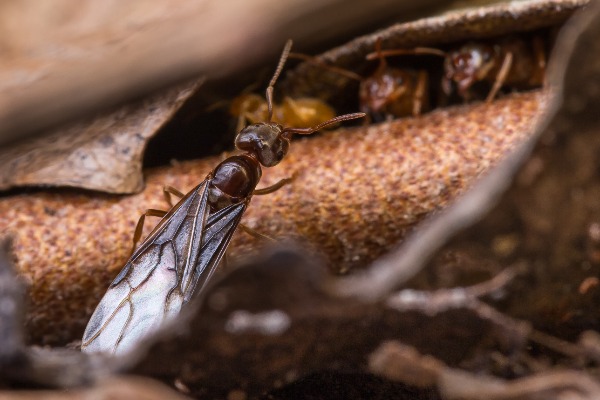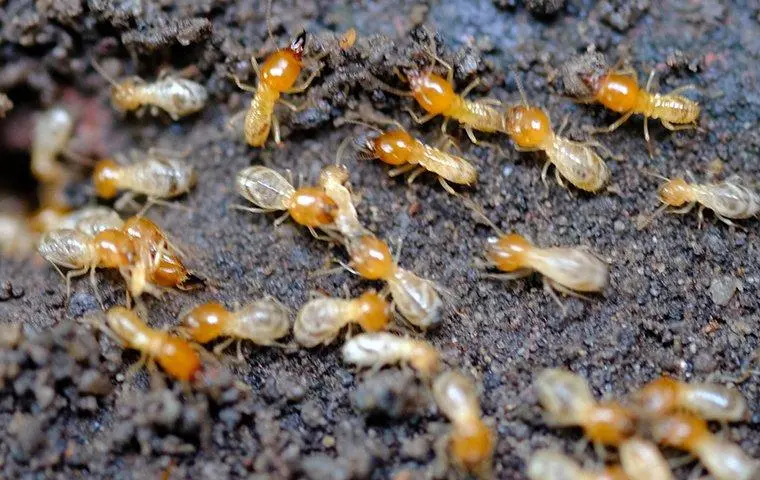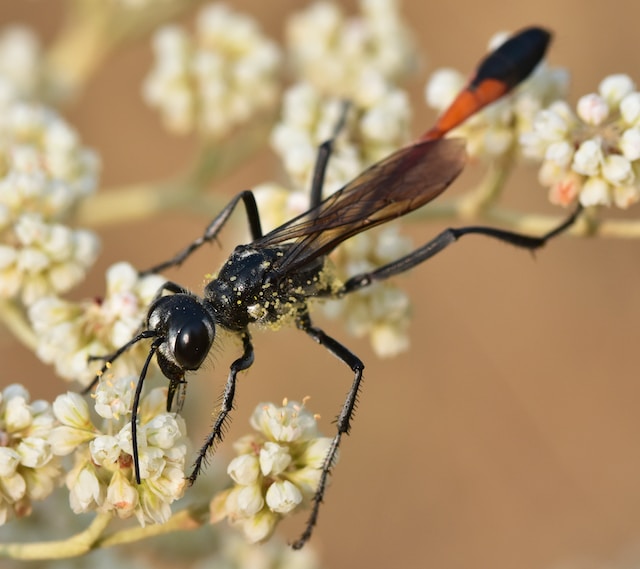
You spot a tiny creature scurrying across your kitchen countertop, and it appears to be an ant at first glance. But upon closer inspection, you notice something unusual—it has wings!
What on earth are these bugs that look like ants with wings? If you’ve ever encountered these mysterious creatures in Raleigh, North Carolina, fear not!
This blog post will explore the fascinating world of insects resembling reproductive ants. Join us as we unravel the mystery behind these peculiar bugs and discover practical ways to bid them farewell.
Identifying Bugs That Look Like Ants With Wings
There are a few insects that look like winged ants– some with destructive tendencies too! Check out this list to know what pest is plaguing your backyard!
Flying Termites

Picture this: it’s a warm summer evening, and suddenly, you see a swarm of winged insects taking to the air. Are they flying ants or flying termites?
Flying termites, or termite swarmers, are nature’s architects of destruction. These determined insects emerge from their colonies, ready to embark on a mission to find love and establish new termite kingdoms. But here’s the twist: their appearance can easily be confused with that of flying ants.
With their two pairs of wings and similar size and shape, flying termites and ants can look like two peas in a pod. But there are some key differences if you look closely.
Flying termites have straight antennae, a plump waist, and wings of equal size. On the other hand, flying ants sport elbowed antennae, a narrow waist, and front wings that outstretch their hind wings. It’s like a subtle fashion show in the insect world!
Adding to the confusion, both species engage in dramatic swarming behavior. Imagine a cloud of winged critters dancing in the air, searching for a soulmate and a place to call home. It’s a mesmerizing sight! But be careful not to get swept up in the moment and mistake these industrious termites for their ant counterparts.
Remember, while flying ants are usually harmless, flying termites can signal trouble. They could be the precursors of a hidden termite infestation. So, if you suspect the presence of these crafty architects, it’s wise to call in the reinforcements—professional pest control experts who can accurately identify and tackle any termite woes.
Wasp Species
In the insect world, appearances can be deceiving, and the line between species can blur. Wasps are other bugs that look like ants with wings.

Some species of wasps, such as parasitic wasps and paper wasps, can exhibit a body shape and coloration that closely resembles that of flying ants. They share a similar segmented body structure and may have a dark brown or black coloration, making them appear ant-like at first glance.
The confusion arises because both wasps and ants belong to the order Hymenoptera, which includes various stinging insects. They often have similar body proportions and display communal behaviors. However, some key distinctions can help differentiate between the two.
One noticeable difference lies in their antennae. Wasps typically possess elbowed antennae with a distinct bend or joint, while ants have straight antennae. Additionally, their waist regions differ. Wasps have a slender and defined waist, whereas ants typically have a more constricted and pronounced waist.
Dealing with Bug Infestations
No matter what pest you’re dealing with in Raleigh, North Carolina, you should know the best ways to handle each insect. Check out these tips on dealing with ants (or any bugs that look like ants with wings) that you may find in your home!
Here’s some information on handling ant, termite, and wasp infestations:
Ant Infestations
Keep your surroundings clean, as ants are attracted to food and water sources. Seal food containers tightly, wipe down surfaces regularly, and promptly clean up spills. Repair cracks, gaps, and openings where ants can enter your home. Use caulk or weatherstripping to seal gaps around windows, doors, and utility lines.
You should always keep your kitchen free of crumbs, spills, and food residues. Store food securely, and take out the trash regularly. If you want to try out DIY options to keep these pests away from your food, use natural remedies like vinegar, lemon juice, or peppermint oil to repel ants. Place these substances near entry points or areas where ants are commonly found.
Termite Infestations
To be sure you have a termite infestation on your hands, conduct a thorough inspection to confirm termite activity. Look for mud tubes, damaged wood, or discarded wings near windowsills or light sources.
However, hiring a professional termite inspector who can accurately assess the extent of the infestation and identify the termite species is recommended.
Treatment methods vary based on the termite species, the severity of the infestation, and structural considerations. Common options include liquid termiticides, termite baits, and fumigation, but these options are also better left to the experts.
If you want to DIY some of your pest control, address moisture issues, fix leaks, and ensure proper drainage around the foundation. Remove wood-to-soil contact and maintain a gap between soil and wooden structures to decrease the chance of a termite infestation.
Wasp Infestations
Before attempting any wasp control, identify the wasp species and assess their threat level. Some wasps, like yellow jackets and hornets, can be aggressive and pose a higher risk of stings.
Never attempt to remove a wasp nest or try at-home pest control. Wasps are highly dangerous and pose significant threats when disturbed. Instead, rely on a reputable pest agency like Innovative Pest Solutions to take care of the problem for you.
If you’re interested in keeping your yard free of wasps, try out some preventative measures. Eliminate potential attractants by keeping foilage well-trimmed and your lawn taken care of. Keep your garbage in tightly sealed cans, and contact us when you spot a hive forming.
Remember, it’s crucial to prioritize safety when dealing with infestations. If you’re unsure or the infestation is significant, consulting with a professional pest control service is recommended for effective and safe management.
Innovative Pest Solutions is always here to help with many common North Carolina pests. Contact us today to remove any ants, termites, or wasps that may live on your Raleigh property.





